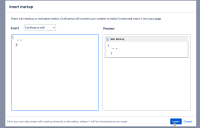-
Type:
Bug
-
Resolution: Fixed
-
Priority:
Medium
-
Affects Version/s: 5.7.4, 5.8.18, 5.9.8
-
Component/s: Editor - Page / Comment Editor
-
59
-
Severity 3 - Minor
-
70
Issue Summary
The recent fix in Confluence 5.7.4 ( CONF-35004
This is polluting the change history of the pages because it adds another version on each page. It also appears that the attachments on those pages are getting re-indexed.
I understand the fix may have been intentional but it's having some bad side-effects.
Also related:
Steps to Reproduce
- Set up a Confluence instance with the new affected versions.
- Create a new page with Unmigrated-wiki-markup macro as shown below or monitor an existing page with it.
- Install/upgrade a third-party app that provides macros. Such as the Content Formatting for Confluence plugin version 7.2.4.
- Restart the instance.
Expected Results
No unexpected messages displayed in the UI or application logs and no new, unnecessary versions created.
Actual Results
See notes below.
Notes on re-opening the bug
When this issue occurs, one or two symptoms will be present:
- First, Confluence will display a Migration of unmigrated content due to installation of a new plugin message for an affected page within the All updates landing page.

- In 8.5.x the Publisher and Published date for the new page version created will be retained as per documentation.

- Starting 9.x the Publisher and Published date will not be retained and will appear with Anonymous user and new date when Confluence was restarted.

- In 8.5.x the Publisher and Published date for the new page version created will be retained as per documentation.
- Second, the following message appears in the application logs after plugin install/upgrade followed by a restart.
2025-03-27 10:59:07,358 INFO [macro-migration:thread-1] [render.xhtml.migration.ErrorReportingV2Renderer] render Unable to render content on page BIN:My Test\nWrapping content in unmigrated wiki markup macro due to system error: index -1, length 0
Workaround
A workaround has been added to the description of related ticket CONF-32837, which provides a method via SQL to disable the remigration job on restarts. As with all database manipulation tasks, please be sure to test this on a non-Production environment first.
In the release of 5.10.8, a system variable is added to turn off the remigration behavior during startup. To use this feature:
- Open CONF_INSTALL_FOLDER/bin/setenv.sh (setenv.bat or service under Windows)
- Locate "CATALINA_OPTS" and add the below line to the file:
CATALINA_OPTS="-Dconfluence.startup.remigration.disable=true ${CATALINA_OPTS}" - Save the file and restart Tomcat.
![]() This workaround has been verified to work for Confluence 9.x and would need to be present in the setenv file prior to the first restart of Confluence after an upgrade.
This workaround has been verified to work for Confluence 9.x and would need to be present in the setenv file prior to the first restart of Confluence after an upgrade.
- has a regression in
-
CONFSERVER-99596 Confluence remigrates Wiki Markup content on restart if a plugin is updated
-
- Closed
-
- is related to
-
CONFSERVER-32318 Macro Migration Service is Automatically Set to True After Upgrade
-
- Closed
-
-
CONFSERVER-35185 Page containing an unknown macro is counted as unmigrated content
-
- Closed
-
-
CONFSERVER-32837 Make the Macro remigration job configurable
- Gathering Interest
- mentioned in
-
Page Loading...
-
Page Loading...
-
Page Loading...
-
Page Loading...
-
Page Loading...
-
Page Loading...
-
Page Loading...
-
Page Loading...
-
Page Loading...
-
Page Loading...
-
Page Loading...
-
Page Loading...
-
Page Loading...
-
Page Loading...
-
Page Loading...
-
Page Loading...
-
Page Loading...
-
Page Loading...
-
Page Loading...
-
Page Loading...
-
Page Loading...
-
Page Loading...
-
Page Loading...
-
Page Loading...
-
Page Loading...
-
Page Loading...
-
Page Loading...
-
Page Loading...
-
Page Loading...
-
Page Loading...
-
Page Loading...
-
Page Loading...
-
Page Loading...
-
Page Loading...
-
Page Loading...
-
Page Loading...
-
Page Loading...
-
Page Loading...
-
Page Loading...
-
Page Loading...
-
Page Loading...
-
Page Loading...
-
Page Loading...
-
Page Loading...
-
Page Loading...
-
Page Loading...
-
Page Loading...
-
Page Loading...
-
Page Loading...
-
Page Loading...
-
Page Loading...
-
Page Loading...
-
Page Loading...
-
Page Loading...
-
Page Loading...
-
Page Loading...
-
Page Loading...
-
Page Loading...
-
Page Loading...
-
Page Loading...
-
Page Loading...
-
Page Loading...
-
Page Loading...
-
Page Loading...
-
Page Loading...
-
Page Loading...
-
Page Loading...
-
Page Loading...
-
Page Loading...
-
Page Loading...
-
Page Loading...
-
Page Loading...





